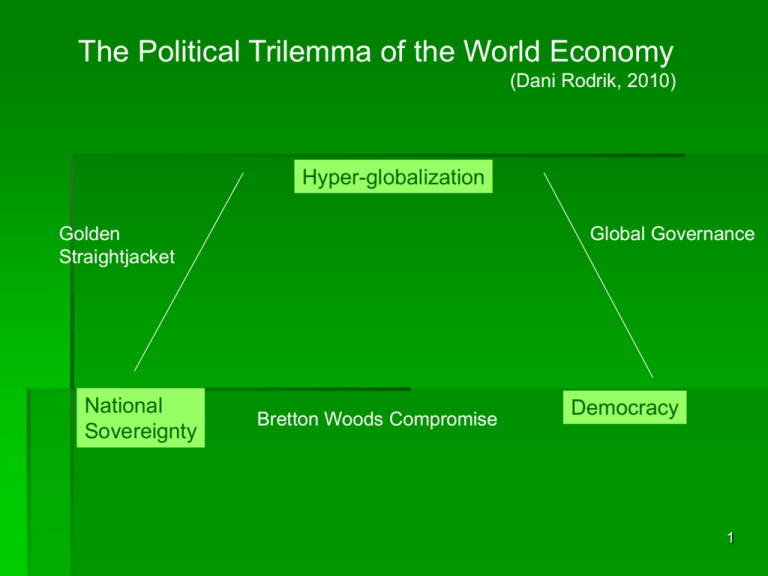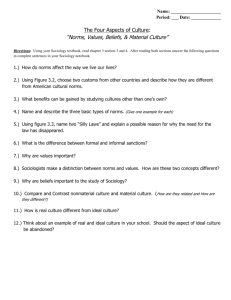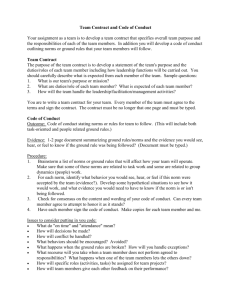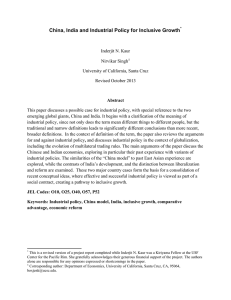Democracy
advertisement

The Political Trilemma of the World Economy (Dani Rodrik, 2010) Hyper-globalization Golden Straightjacket National Sovereignty Global Governance Bretton Woods Compromise Democracy 1 What is democracy? Democracy is a certain class of relations between states and citizens A regime is democratic to the degree that political relations between the state and its citizens feature broad, equal, protected and mutually binding consultation Democratization means net movement toward broader, more equal, more protected, and more binding consultation De-democratization is movement in the reverse (Tilly, Democracy, 2007) 2 "Has Globalization Gone Too Far?," Dani Rodrik, Ch. 28, pp. 241-246 (Excerpted from Rodrik, “Has Globalization Gone Too Far?,” in Has Globalization Gone Too Far?, Institute for International Economics, pp. 2, 4-7, 77-81.) 3 GL is exposing deep fault lines b/w social groups Between those who have the skills and mobility to flourish in global markets and those who don't have these advantages or perceive the expansion of unregulated markets as a threat to social stability and deeply help norms tension between the market and social groups such as workers, pensioners, and environmentalists, w/ governments in the middle 4 Sources of tension between the global market & social stability 1) Reduced barriers to trade and investment increase asymmetry b/w groups that can cross borders and those that can't 2) GL has made it exceedingly difficult for governments to provide social insurance – one of their central functions and one that has helped maintain social cohesion and domestic political support for ongoing liberalization throughout the postwar period 3) GL engenders conflicts within and b/w nations over domestic norms and the social institutions that embody them 5 1: Reduced barriers to trade and investment increase asymmetry b/w groups that can cross borders (directly or indirectly through outsourcing) and those that can't Those who can: owners of capital, highly skilled workers, and many professionals who are free to take their resources where they are most in demand Those who can't: many unskilled and semiskilled workers and most middle managers their services are elastic, i.e., they are more easily substituted by the services of other people across national boundaries Most GL research has focused on the downward shift in demand for unskilled workers rather than the increase in the 6 elasticity of demand GL enables “substitutability,” transforming the employment relationship The postwar “social bargain” b/w workers and employers (i.e., steady increase in wages and benefits in exchange for labor peace) has been undermined Substitutability has concrete consequences: Workers now have to pay a larger share of the cost of improvements in work conditions and benefits (i.e., bear greater incidence of nonwage costs) They have to incur greater instability in earnings and hours worked in response to shocks in labor demand or labor productivity (i.e., volatility and insecurity increase) Their bargaining power erodes, so they receive lower wages and benefits whenever bargaining is an element in setting the terms of employment 7 2: GL has makes it difficult for governments to provide social insurance – one of their central functions and one that has helped maintain social cohesion and domestic political support for ongoing liberalization throughout the postwar period Governments have used fiscal powers to insulate domestic groups from excessive market risks, especially when they're foreign in origin, but government has been downsizing for decades, reducing its social obligations 8 3: GL engenders conflicts within and b/w nations over domestic norms and the social institutions that embody them As technology becomes standardized and diffused internationally, nations with very different sets of values, norms, institutions, and collective preferences begin to compete head on in mkts for similar goods presents opportunities for trade among countries at very different levels of development Trade becomes contentious when it unleashes forces that undermine the norms implicit in domestic practices e.g., plant closed in South Carolina for child labor in Honduras or French pensions cut in favor of Maastricht Trade policy almost always has redistributive consequences (among sectors, income groups, and individuals) 9 The Role of National Governments Policymakers must respond to these tensions without sheltering groups from foreign competition through protectionism: 1) Strike a balance b/w openness and domestic needs 2) Do not neglect social insurance 3) Do not use "competitiveness" as an excuse for domestic reform 4) Do not abuse fairness claims in trade 10







